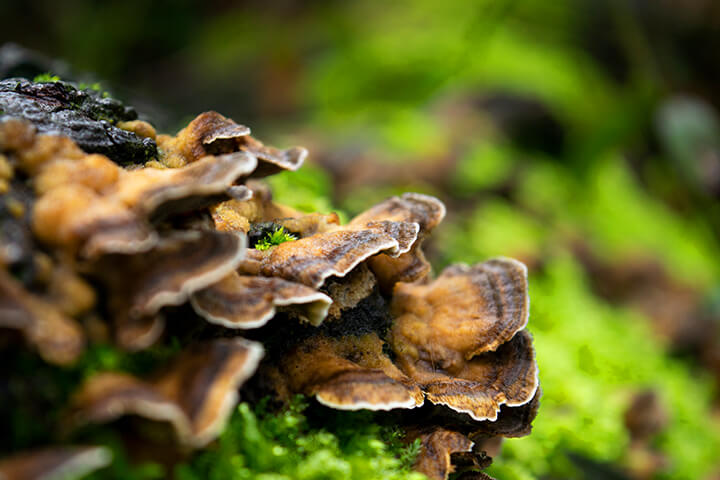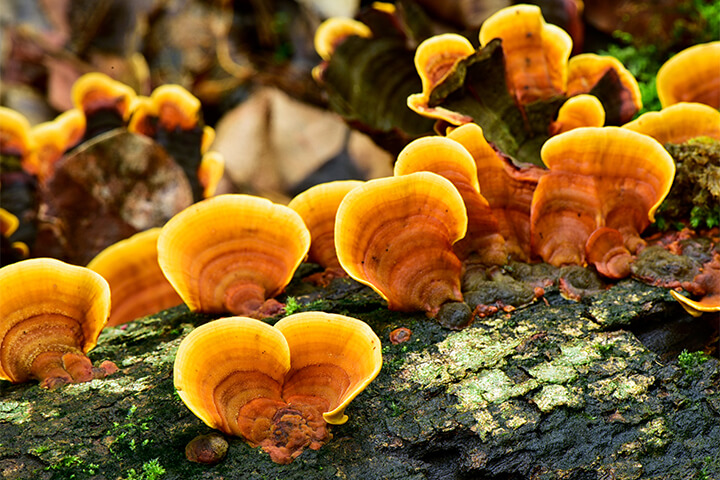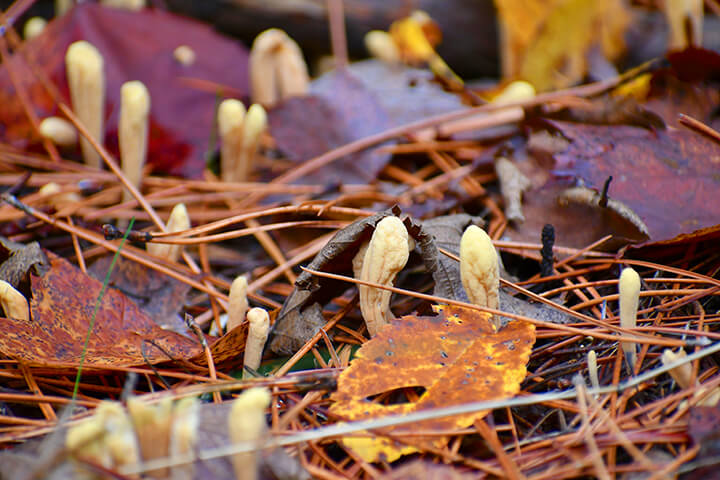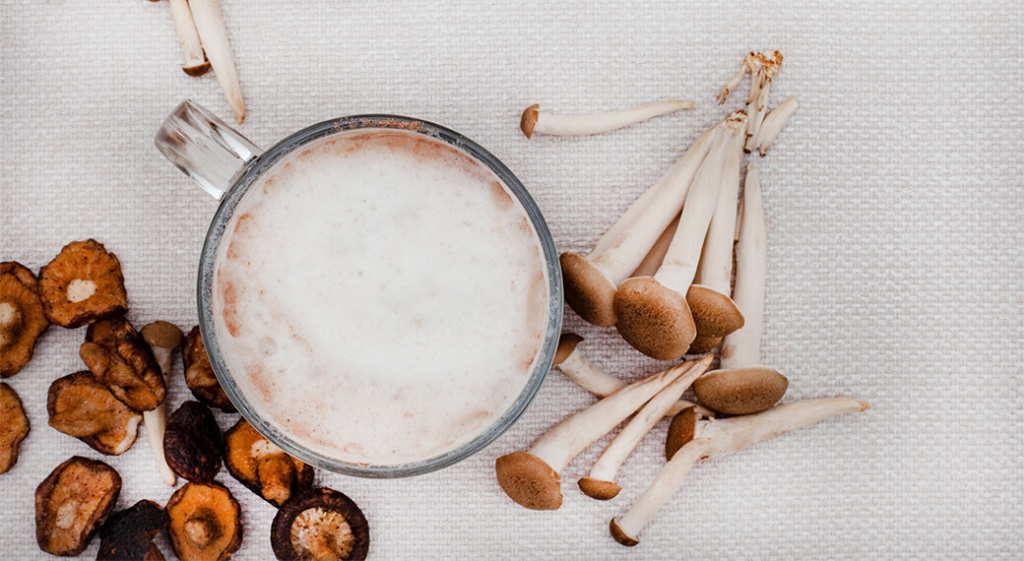While mushroom coffee is still a niche market compared to regular coffee, its popularity is growing in countries like the United States and Australia. In this article, we review the perceived health benefits fueling its fandom. Then, we look at the specific types of mushrooms used by the coffee industry, and techniques used for producing this beverage.
Consumers Are Saying Yes to Mushroom Coffee

The trend of using mushrooms in coffee has gained traction for several, mostly health-related reasons. Certain types of mushrooms contain adaptogens which are believed to help the body cope with stress and fatigue, potentially lowering cortisol levels. Mushrooms also contain antioxidants and polysaccharides, known to improve the immune system and reduce inflammation. Many fans of mushroom coffee essentially feel that if you’re going to drink coffee every day, why not make it more beneficial to the body?
Another reason mushroom coffee has increased in popularity is for its novelty. For adventurous palates, the earthy, umami flavor of mushrooms adds another dimension to their coffee experience.
Mushrooms That Put the Fun in Fungus Beverages

Not every type of mushroom works well in coffee. These are some of the most common mushrooms used by the coffee industry:
Chaga
While they look like a mass of burnt charcoal living on the sides of birch trees, this adaptogenic fungus is a nutritional powerhouse, used in traditional medicine for centuries. Known for its antioxidant and anti-inflammatory properties, chaga lends a slightly bittersweet, woodsy taste to coffee.
Reishi
Often referred to as the “mushroom of immortality” and “king of mushrooms,” reishi have been prominently featured in Traditional Chinese Medical (TCM) for thousands of years. In terms of coffee, reishi has adaptogenic properties and may support stress reduction and sleep improvement. Given that its earthy, slightly bitter taste can be masked with sweeter ingredients, reishi is a favorite amongst mushroom enthusiasts.
Lion’s Mane
Recognized for its potential cognitive benefits and smooth, blendable texture, lion’s mane has been purported to improve focus and memory. Young lion’s mane mushrooms have a mild, slightly sweet taste with a meaty texture similar to seafood or scallops. As they mature, the flavor becomes more assertive.
Cordyceps
Cordyceps have earned the nickname “zombie fungus” because they are parasitic to insects, infecting and eventually taking over their host’s body. Traditionally used for energy and stamina, Cordyceps come in different varieties (over 400 different species) with subtle flavor variations. This type of mushroom has the potential to enhance exercise performance and reduce fatigue, so it’s the perfect choice for athletes with an adventurous coffee palate.
Maitake
Maitake, meaning “dancing mushroom” in Japanese, have the potential to grow to impressive sizes. From time to time, specimens reach the size of a toddler, up to 3 feet wide and weighing over 50 pounds. In coffee, maitake adds a rich, savory umami flavor. It boasts antioxidant and immune-boosting properties.
Turkey Tail
Known for its potential gut health benefits, turkey tail has a mild, slightly sweet flavor. To that end, it has the potential to promote the microbiome and reduce inflammation. In nature, turkey tail mushrooms play a vital role in its ecosystem by decomposing dead wood and returning nutrients to the soil.
Sun Agaricus
Hailing from the rainforests of Brazil, the sun agaricus was discovered in the 1960s and quickly gained popularity worldwide. For mushroom coffee lovers, this adaptogenic mushroom is packed with antioxidants, beta-glucans, and other bioactive compounds. Due to its composition, sun agaricus mushrooms may boost the immune system and fight inflammation, while imparting a slightly nutty flavor.
Adding Mushrooms to Your Mug

Integrating mushrooms into coffee can be done in a couple of ways: direct blending, infused blending, and adding extracts.
Direct blending
Direct blending is a prevalent technique involving the direct grinding of dried and powdered medicinal mushrooms alongside coffee beans. This beverage brews like standard coffee, while harnessing the added benefits of the mushrooms. Direct blending effectively preserves most of the fiber and other healthy compounds inherent in the mushroom powder.
Despite offering the most robust mushroom flavor and potentially higher overall nutrient content, this approach may alter the taste and texture of the coffee. On the other hand, the beauty of direct blending lies in its simplicity. It requires no additional preparation beyond the brewing process.
Infused coffee
Infusing mushrooms into coffee involves steeping whole or chopped mushrooms in brewed coffee. This technique imparts the coffee with the flavor and potential health benefits of the mushrooms without significantly affecting the coffee’s grind. While it may not capture all the nutrients present in mushrooms and might require more time than other techniques, the infusion method is effective at extracting specific beneficial compounds like beta-glucans. In this situation, the resulting flavor is subtler, making it an appealing option for those seeking a milder taste.
Extract addition
For a convenient approach, some individuals prefer the extract addition method wherein concentrated mushroom extracts are brewed directly into coffee. Moreover, extracts are available in liquid or capsule form. They also provide an easy way to infuse mushrooms without altering the coffee’s grind or texture.
Designed to concentrate specific nutrients or active compounds, extracts offer the potential for a higher dosage in a smaller volume. It’s worth noting that extracts may lack fiber and other beneficial components compared to the direct blending method. However, they provide the least noticeable impact on the coffee’s taste, while delivering a concentrated dose of specific nutrients.
Mix & Match Blends
If you’re interested in maximizing nutrients, consider a blend that incorporates both mushroom powder and extract. However, if flavor and ease-of-use are more important, you might prefer infusion or simply adding a pre-made extract to your regular coffee.
For ultimate convenience, head straight to ready-made blends. Companies that offer pre-blended options combine coffee with specific mushroom varieties to achieve specific desired effects, which are always fun to relay to your customers and a huge selling point for mushroom coffee in general.
A Final Sip of Earthy Rejuvenation

Whether you are a coffee shop with adventurous clients, café, yoga studio, or upscale hotel, if your customer base is interested in health and wellness, mushroom coffee can add some dimension and intrigue to your menu. Have you tried mushroom coffee? Tell us about your experience in the comment section!



